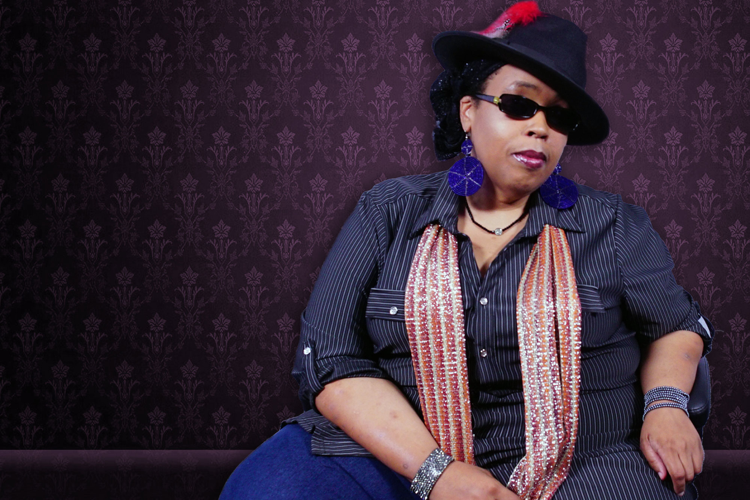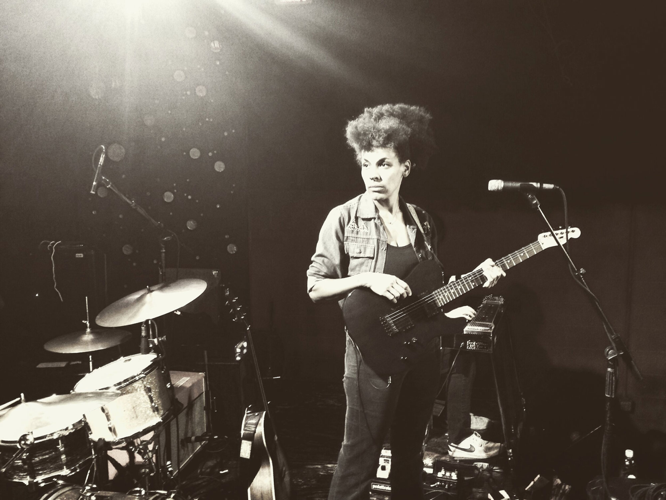
Lilli Lewis
Contextualizing how and why Black artists will play a major role in country music’s dynamic future begins in the distant past. The Carter Family’s music was crucial in defining country music as a marketable genre in the 1920s and ’30s, and their work is still a fundamental influence today. Early in their career, they relied on a Black man named Lesley Riddle to help them gather songs in Black communities all over Appalachia. Some of the best-known tunes in the Carters’ repertoire — including “The Cannonball,” aka “Cannonball Blues” — came from this relationship, and Riddle was a significant influence on Mother Maybelle Carter’s distinctive guitar style.
Amid intense and profound calls for justice by and for the Black people of this nation, there’s a growing sense that the time is coming for Black women to have a seat at country music’s table. Many have aspired to succeed in the country world in years past, moved by the music as much as their white peers, though none has been afforded the support that leads to a long and widely renowned career. Not unlike Riddle, the group of Black women currently making country and country-adjacent music — artists like Mickey Guyton, Yola, Rhiannon Giddens and Brittney Spencer — brings a wealth of talent and deeply rooted traditions to this movement.
Lilli Lewis is a wide-ranging musician who uses soul, blues and more in her work, and she’s also general manager and head of A&R for Louisiana Red Hot Records. Kamara Thomas is a country and roots recording artist who founded the organization Country Soul Songbook to lift up the voices of Black, brown and LGBTQ people in roots music. They envision a future where Black female artists excel across the music business, in a society radically and positively altered by the multitude of forces that have been at play in 2020. However, their confidence is muted by a note of caution. Both women speak powerfully about being made emotionally fragile by years of interactions with the those in the country music industry who didn’t value them as artists. They note, though, that the twin impacts of the #MeToo and Black Lives Matter movements have buoyed their resolve and reenergized their passion.
“There’s a head game that exists where you think, ‘The industry doesn’t value me, so I must not be valuable,’ ” says Thomas. “However, we’re waking up now and noticing that the problem isn’t us. Instead, the problem is the country music industry’s framework. Once you see the problem, you can’t unsee it.”
“Country and Americana share space with the profound legacies of entrepreneurial female artists like Ma Rainey and Bessie Smith,” says Lewis. “All that’s happening now is that, across this generation of artists, we remember that tradition. The entrepreneurial spirit of Black female artists has sustained us so long outside of the spotlight. Because of this, once we’re in that light, the industry can’t manufacture a separate story from the unique and connective one we have, and are controlling, about ourselves and our work.”
Thomas reflects on how we’ve been building slowly and steadily toward these circumstances over several years.
“Black folks, in general, have been reclaiming spaces that we ancestrally know are ours,” says Thomas. “Mirroring American society at present, we’re taking things because industries aren’t necessarily incentivized to give them to us. Currently, we’re laying the foundation and welcoming those who want to build with us.”
Thomas isn’t alone in this notion. On a recent episode of the NPR program Amplify With Lara Downes, the host spoke with Rhiannon Giddens, whose career has focused on highlighting the vital importance of Black musicians’ contributions to the traditions that make up country music. “There’s a shared space existing,” Giddens said. “There’s a chance for a great spiritual awakening in country music led by kindness and inclusion. We still have to figure out the path to get there, but at least we have the tools.”
You don’t have to look further than Apple Music for the best example of this notion at work. Rissi Palmer, a Black female country artist who has had multiple singles on Billboard’s Hot Country Songs chart, has a weekly online radio program on Apple Music Country called Color Me Country. The show puts a spotlight on Black female voices in the genre.
The program’s name is an homage to another Black female country singer, Linda Martell. Martell released one album, Color Me Country, in 1970, and she sang its single “Color Him Father” as the first Black woman to perform on the Grand Ole Opry. Palmer’s show intentionally provides a platform for Black women and showcases their voices and art as worthy of celebration within the genre.
“Outside of the fact that I’m Black, outside of the fact that I’m a woman, I’m also a musician,” Palmer told roots-music-focused media group The Bluegrass Situation in September. “[Color Me Country] is where people can just talk. And not just talk about race, but music and being a musician. A space free from worrying about alienating anybody or offending anyone. It’s just honest.”

Kamara Thomas
Thomas sees that Black women are ready to take command, in part because they have experienced the hardships and challenges of the music business firsthand.
“Our voices are empowered because — unlike country music’s airtight-seeming white patriarchy — we can lead because we see a clear perspective on America’s best future through our lives, which serve as a lens that society needs right now,” Thomas says. “With our vision, we’re wielding our power by seeing into the future.”
Another key aspect of a larger role for Black women in country music’s future is the genre’s expansion into the streaming world. Traditionally, success in country music has been driven forcefully by radio airplay. Nielsen Music’s 2019 Year-End Report notes that six of the 10 most-played artists on all radio stations over the previous decade were country artists. It’s well-known that country radio hasn’t been welcoming to women, with negligible visibility for women of color.
But country’s focus on streaming is growing. In recent years, Spotify, Amazon Music and Apple Music have all established offices in Music City. That same 2019 report from Nielsen also mentions that Luke Combs’ 2019 album What You See Is What You Get set a new record for release-week streaming of a country record, with 74 million streams of songs from the LP. And data from another 2019 study conducted by Nielsen and radio programming group P1 notes that more than half of the country music radio listeners surveyed, ages 18-44, report streaming music every day.
In his recent Time Magazine piece “The Pandemic Could Have Hurt Country Music. Instead, the Genre Is Booming,” writer Andrew R. Chow notes that attitudes toward overt pop influences in country music have shifted over the past 20 years.
“That border is coming down, and a lot of that has to do with streaming,” says Melinda Newman, Billboard’s editor for West Coast and Nashville divisions, quoted in Chow’s piece. “People who stream don’t look at genre.”
They don’t look at race, either. Chow’s piece notes Black male country star Kane Brown as a beneficiary of the streaming windfall. He collaborated with established rapper Swae Lee and rising R&B star Khalid on the single “Be Like That,” which has been streamed some 97 million times since its release in July. At the same time, white stars like Sam Hunt also rack up massive stream counts while building a signature sound on music developed by Black artists.
However, history proves that Black women can level up and drive that conversation in a new direction. A Black woman singing a country song — Whitney Houston’s cover of Dolly Parton’s “I Will Always Love You” — is among the longest-running songs on Billboard’s Hot 100 pop singles chart. At 14 weeks, its reign at No. 1 is matched or beaten by only nine other songs, including the current record-holder, Lil Nas X’s “Old Town Road.”
Black women deserve a stake in country music’s future as an opportunity to reclaim the pop-culture-defining energy “borrowed” from them. See Elvis Presley’s smash hit with Big Mama Thornton’s “Hound Dog” — as he helped shape the popular notion of rock ’n’ roll, Presley also had a massive influence on country musicians — as well as the music that the Carter Family learned from Black communities.
As the country industry evolves, what Thomas calls “ ‘old-boy country music’ that perpetually appeases the status quo” will exist alongside a Black female-led movement that Lewis describes as having “a multidimensional source of allyship-aided empowerment that exists without established industry norms.”
“Once unleashed, it’ll represent the future,” Thomas adds. “Successful white artists will continue to invite Black female artists to do stuff with them, plus all sorts of bold actions will be taken by artists, in general, wanting to free themselves. It will be a community where power doesn’t as much benefit old structures as it does aid in people achieving freedom. … Black women will achieve this success because the world has changed to a place where Black people are receiving the respect they demand. In spite of the country music industry, Black women will define country music’s future.”






